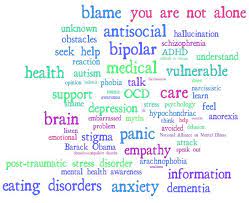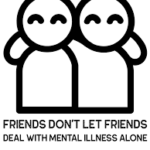Mental illness is a serious topic that needs to be addressed. 1 in 5 adults is living with mental illness, and the leading cause of disability worldwide. This post will help you understand what mental illness is, how it affects people differently, and provides tips for dealing with mental illness.
Although, there are many treatments available for those living with mental illness. Some are more successful than others based on the person’s situation. The best way to deal with someone who has a mental illness is by understanding that they may need you more than ever at this time in their life- which can be difficult but also rewarding if done correctly!
Contents
What Is Mental Illness?

Mental Illness can be defined as a group of behavioral disorders that affect emotional, social, and psychological well-being.
In other words, a mental illness is an impairment in cognitive or functional ability which interferes with normal personal interactions, occupational performance, and daily activities. It may include depression, anxiety disorder, bipolar disorder, schizophrenia, etc., all these are mental illnesses.
Mental illness is not a sign of weakness or something that can be ignored by the individual suffering from it. It’s important to learn about mental health and its symptoms to take appropriate steps towards treatment.
Symptoms Of Mental Illness

There is no one-size-fits-all answer to this question as mental illness can manifest itself in different ways in different people. However, some common symptoms of mental illness include:
Depression
It is feeling persistently sad or anxious, having low energy, problems with sleep and appetite, withdrawing from friends and activities, feeling worthless or guilty, thoughts of suicide.
Anxiety
It involves feeling nervous, irritable, having a hard time controlling worrying thoughts and fears that something bad will happen, or repeating negative thinking patterns.
Bipolar Disorder
It is characterized by mood instability in alternating episodes of mania and depression with intervals in-between the two extremes where one feels normal for some time.
- During manic episodes, one might feel extremely happy or irritable.
- During depressive ones, the person may have feelings of sadness and emptiness.
Schizophrenia
This mental illness is often characterized by delusions (false beliefs), hallucinations (seeing/hearing things that are not there), disorganized thinking/speech, unusual behavior which can be either catatonic (paralyzed) or agitated, and a lack of motivation.
Coping Strategies For Dealing With Mental Illness

There are various steps one can take to cope with mental health problems. Some of them include:
Reach out for help
The first step is always admitting that you need some form of assistance. This could be reaching out to family, friends, or your medical provider for treatment options in dealing with mental illness. Then join a support group or therapy to talk about your experiences and feelings with people who understand what you are going through.
Exercise
This is a great way to deal with stress, anxiety, and depression. It releases endorphins which have mood-boosting effects and can help improve sleep quality.
Avoid alcohol/drugs
This might seem like a good option for dealing with mental illness. But substance abuse can make symptoms of depression and anxiety worse.
Eat healthy food
Mental health is just as dependent on your physical state as it is on how you feel emotionally. A balanced diet that includes fruits and vegetables will help keep the body’s immune system healthy and strong.
Stay positive
This may be difficult at times, but it’s important to remember that things can and will get better. Give yourself time and don’t rush the healing process.
Treatment Options For Dealing With Mental Illness

There are many different treatment options for mental illness which will be discussed in detail below. However, it’s important to seek professional help as soon as possible if you think you might be suffering from one.
Psychotherapy (or talk therapy)
This is a common treatment option for depression or anxiety that involves talking to a doctor or counselor about your feelings and experiences. It’s important to find the right therapist, as it can be very helpful in resolving issues through cognitive behavioral therapy, interpersonal psychotherapy, etc. Psychotherapy can also help you understand yourself better and get rid of any negative thought patterns.
Medication
If you are dealing with a mental illness, your doctor might prescribe medication to help control the symptoms. This could include antidepressants, antipsychotics, or mood stabilizers. It’s important to take medication as prescribed and not stop taking it without consulting your doctor first.
Hospitalization
In some cases, it might be necessary for the person suffering from mental illness to opt for hospitalization for treatment and care. This is usually done if the person is a danger to themselves or others. It’s important that you feel safe in your home environment so this isn’t something you would want. But rather a last resort when all other options are exhausted.
Support Groups/Online Forums
Connecting with people who understand what you’re going through and finding a safe environment in which to share your feelings can do wonders for mental health. This is especially true when one feels alienated or alone, as individuals dealing with mental illness might feel at times. If you don’t live near any support groups, there are also many online forums where you can find help.
How To Help Someone Dealing With Mental Illness

If someone you know is dealing with mental illness, there are various ways you can help them.
Educate yourself on the condition
This will allow you to have a better understanding of what your loved one is going through and how best to support them.
Offer practical assistance
This could include helping out with household chores or taking care of children. You can also open yourself to driving them to appointments, helping with grocery shopping and housework, or just being there for support.
Listen without judgment
It’s important to allow the person to talk about their experiences and feelings without judgment. Let them know that you are there for them and will support them through thick
Be there for them emotionally
This is one of the most important things you can do. Let them know that they are not alone and that you will support them through thick and thin.
Be patient
Mental illness can be a long and difficult journey. Mental illness can be a long and difficult journey, and the person might not get better overnight. Just offer your support and love throughout the process.
Conclusion
Mental illness can be a difficult thing to deal with, both for the person suffering from it and those around them. However, there are many different treatment options available and with the right support, people can and do recover. With the right treatment and support, people with mental illnesses can recover and lead happy healthy lives. Stay positive and be there for the person you love.
If you are looking for affordable Online Counseling MantraCare can help: Book a trial therapy session


